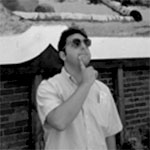Inner Astronomy

Peter Hajinian
Peter Hajinian lives, works, and writes in Minneapolis. His stories have appeared in Litro, The Quotable, and Halfway Down The Stairs. You can read and enjoy more of his work at the King Zucchini.
+ King Zucchini
On Wednesday, I ran into a friend of a friend, Ted. One of those people you meet once, but because of a life change or accident, you hear a lot about them from a distance. Ted’s story, as I gathered in snippets from other friends, was that he went blind. As a photographer, this news entranced and horrified me. Could that really happen?
Ted could see just fine when I first met him. Or so I thought. Apparently, his vision had shown signs of weakness even back then, but he didn’t say anything. Now, at that coffee shop, — after a brief reintroduction — we shared a table and he told me the whole story.
The doctors couldn’t explain it. They just declared it inevitable. The second, third, fourth opinion, each one of them said the same thing. There hadn’t been any history of loss of eyesight in the family, and there was no accident that may have caused it to happen to him. He clicked his tongue, and silently walked home.
What do you do, when you lose your sight? They gave him pamphlets and books to prepare himself. He took them as an affront. Like putting a clock in a man’s hands and telling him when it runs out, so will his time on Earth. He left them alone and brooded.
What do you keep? What do you forget? He asked himself this while he waited for the bus one day. Staring off into the middle distance, eyes open without seeing. In the ark of his mind, he decided to store colors. He wanted to remember vibrancy.
Red, yellow, blue. He went primary. If he could remember those, he could cover off on the in-betweens. Also, he was having trouble remembering green. He’d stare at a verdant plant in full sunlight and close his eyes. Two minutes later it was gone.
Like a human camera, he worked to fill his memory with images. He questioned photographers on their craft, arriving at the conclusion that it’s all about light. Sunlight. That was when we met the first time. I was the one who showed him how to use a light meter.
But the strength of light wasn’t exactly what he was after. He carried around a small white square in his wallet, a white balance. As the vignette of blindness began to creep in on his vision, he’d find a spot in the afternoon sun to sit and gather the gold off the square.
The doctors were right, it was inevitable. Like the emptiness of space between stars, the darkness expanded, pushing the vibrancies he’d stored away further and further apart. Each afternoon, the white card faded in front of his eyes.
Long before this, he’d secretly read the pamphlets and books the doctors gave him. He’d learned to use a walking stick. He’d learned to keep track of the sums of money in his wallet, arranged his apartment to appeal to his new state. He’d prepped for everything they told him.
But it wasn’t enough, he told me. He felt like an astronaut, stepping out of the capsule into interstellar space. Even in the city he grew up in, the expanses between buildings felt huge. The yawning gaps between crosswalks. The prairies of parking lots. Endless stairs.
After a while, things took shape. They began to correspond to the vibrant colors in his head, separated by the negative space he never realized was there. His mind was mapping and remapping. Working in the dark to put together old bits of information. Fashioning something new. A universe, all his own, placed on top of the old one.
From his observatory, he’d work to improve his calculations of the distances and between heavenly bodies, charting their movement through space. When he was tired, he’d sit and enjoy the way the colors and lights and shapes arranged themselves in his mind.
What was it like, I asked him, to be the sole astronomer of this universe? He smiled and clicked his tongue, eyes staring purposefully into the middle distance.
“It’s brilliant.”
© Peter Hajinian
